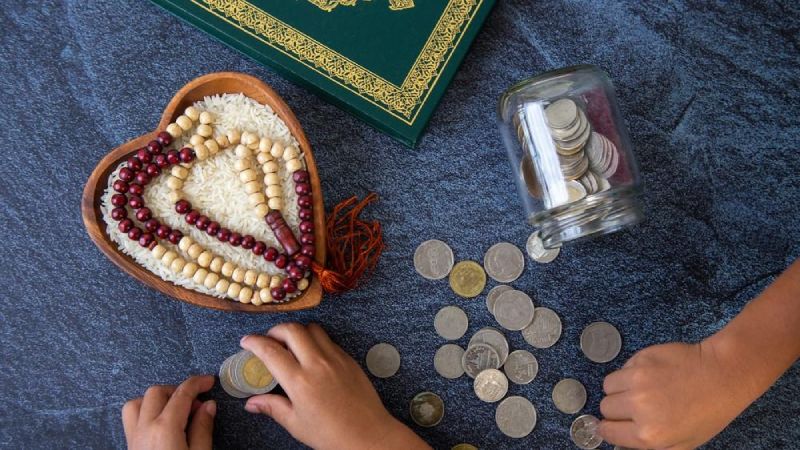Festivals & Events
5 Tips for Managing Your Budget During Ramadan and Beyond

Muslims all across the world observe Ramadan as a sacred month during which we engage in a period of intentional practice that includes fasting, prayer, and introspection. Putting spirituality, family, and community first is a great idea right now. That being said, there can be an excessive amount of pressure to manage daily life, participate in social and spiritual activities, and deal with the cost-of-living crisis. Likely, you weren’t alone if you’ve felt poorer over the past year or two. “Just existing” felt more expensive probably due to rising gas and electricity bills and a general decline in the supply of many of our household necessities: this is when the so-called “cost-of-living” crisis began. January 2022 saw a 15% increase in the price of the “typical” basket of goods compared to January 2022. Thus, “typical” habits and behaviors might not work out for us this year.
When we accept our limitations, we can manifest more authentically when we do. Continue reading for five tips on how to live a balanced, cost-effective life throughout Ramadan and beyond to help you achieve this goal.
- Spend Your Money Carefully
The simplest budget strikes a balance between your income and expenses over a specified time frame.
The challenge with any budget is that things happen and life is unpredictable. The most crucial thing to remember during Ramadan is that there will be exceptions, whether it’s making large donations to the mosque or throwing a lavish iftar party. We need to look at the past (use the calendar feature in your banking apps) and the present to truly understand budgeting for it. Know what you can afford.
If you attempted this last year and were unsuccessful, you should take some time to think about why.
Was it guilt?
Was it the fear of appearing well during a performance?
Was it the “everyone is, so I should” mentality of peers?
Was it fomo (“everyone is, so I want to”?
Knowing your “why” will help you affirm and stick to your spending plan because it will help you discover your inner drive.
Therefore, the most important thing is the piety behind your gestures, no matter how big or small.
Conversely, have you not attempted to budget but feel compelled to do so? Let us introduce you to a few easy, low-cost strategies that you might find useful this Ramadan and beyond. Finding balance is the aim, but how? You are free to decide what makes sense for you, whether that means increasing what comes in or decreasing what leaves. Practically speaking, a general budget framework implies that you actually need a few different figures that sum up to cover the “outs.” I’ll list six optional categories below:
- Committed Outs: Pre-paid bills that you are aware will arrive.
- Estimated “Needed” Outs: Expenses you anticipate incurring, such as groceries.
- Estimated Savings Outs: The benefit of having something like this each month is that part of it can be applied to categories 5 and 6 below.
- Estimated “Wanted” Outs: Things like clothes or hair appointments.
- Emergency Outs: A little leeway to cover situations in which our projections might be off or in which a little additional spending might be necessary.
- Estimated Seasonal Outs: Consider gifts and special iftars during Ramadan.
It’s essential to keep in mind that the arrangement matters. It’s worthwhile to start thinking creatively about what you can do with what’s left if, after steps one and two, you’re seeing very little room left. The solution is not to hope for the best or push yourself in any way because May might not be kind to you.
- Manage the “outs”
- Set it and Forget It: This denotes automating! Make sure that your most significant financial obligations are met by setting up direct debits or standing orders. Your sadaqah or zakat is included in this! These days, a lot of charitable organizations provide an automated service that allows you to plan daily donations for the final ten days of Ramadan or the entire month. This can guarantee that you will “Never miss Laylatul Qadr” once more, regardless of how much you donate—£1 or £50.
- The green pyramid is something you may recall. Reduce, reuse, recycle: This useful guideline applies to anything. Perhaps arrange a clothes exchange iftar with some friends before the family get-together if you need new jeans? You’d be shocked at how many items in your wardrobe might end up becoming a new favorite of someone else. (And vice versa, naturally; anybody up for some thrifting?)
- Do it yourself before purchasing: As the title suggests, sometimes we simply must use our imaginations. We could also reword it to mean “involve your community” rather than “just yourself.” Host it as a potluck instead of spending a fortune. Ask your friend who owns a sewing machine to sew up that coat instead of throwing it away because it has a hole in the pocket.
- Never. Shop. without. A list: The reasoning behind this is straightforward: whether you’re shopping for iftar outfits or hauling for your hosting, it’s too easy to get tempted into last-minute add-ons (or even online retailers like asos.com). You will be more selective about what you purchase and how much you are willing to spend if you know exactly what you’re looking for.
- Eat at Home: Before you try that new place on UberEats, get creative and try recipes from TikTok. Cooking may seem like a miracle if you have 30 minutes to spare before Iftar, so prepare some meals in advance. They are more affordable (and quicker) than Deliveroo, and they are dependable and diverse.
- Establish Boundaries: Don’t be scared to let your loved ones and friends know what your needs and boundaries are. Provide low-cost options for getting together, such as “Let’s go for a walk in the park or by the river post Taraweeh.” “Let’s have a potluck, I’ll bring “X” dish” as opposed to “I can’t host.” This can lessen everyone’s workload, which will ease stress and give you more time and energy to devote to the things that are important to you.
- Divide your lists into “needs” and “wants” for extra credit. This has to do with setting priorities. If we don’t take the time to remember that we don’t always need to buy anything, it’s easy to convince ourselves that we have an endless list of things to buy.
- Expand the “ins”
- That pyramid in green? It can be profitable at times.
- Do you remember Vinted and Depop? You can sell your less-used clothing, accessories, and furniture on these websites. There’s a store for everyone, so you can use Vinterior and repurchasing programs like Vestiaire Collective and Farfetch Second Life to give your furniture a new home and higher-end pieces a new lease on life.
Just keep in mind that balance, not perfection, is the aim.
- Look for Expert Advice
Please do not hesitate to seek guidance from a financial advisor or counselor if you are experiencing significant stress and strain due to your inability to manage your finances during Ramadan (financial difficulties are often the cause of familial strain). They can offer more thorough strategies for managing debt and saving money, as well as assist you in creating a budget that works for you.
Enjoying the season and maintaining financial balance go hand in hand. As we all know, there is a direct correlation between financial hardship and worse mental and physical health, with women being disproportionately affected for a variety of reasons. Add to this the fact that you belong to a minority community. In addition, it hurts to put on a brave face because it is “particularly difficult to discuss either money or mental wellbeing,” which the Money and Pensions Service refers to as a “double stigma.” As a result, having candid conversations and open discussions about finding balance this Ramadan is even more important but less common.
- Remember Your Goals
Lastly, keep in mind the actual goal of Ramadan, which is to deepen your relationship with Allah (SWT) and revitalize your soul in preparation for life after Ramadan. Avoid becoming entangled in worldly worries or rituals; instead, maintain your purity of intention and concentrate on the month’s spiritual benefits. As a last resort, just set a savings goal for the month and pit yourself against the clock to be multi-rich by Ramadan’s end.
You can maximize your time and achieve balance in many areas of your life by making sensible financial decisions, establishing boundaries, and leading an intentional life.
-

 Sports4 weeks ago
Sports4 weeks agoAl Ahly vs Inter Miami, 2025 FIFA Club World Cup – Preview, Prediction, Predicted Lineups and How to Watch
-
Health3 weeks ago
Back to Roots: Ayurveda Offers Natural Cure for Common Hair Woes
-

 Tech3 weeks ago
Tech3 weeks agoFrom Soil to Silicon: The Rise of Agriculture AI and Drone Innovations in 2025
-

 Startup4 weeks ago
Startup4 weeks agoHow Instagram Is Driving Global Social Media Marketing Trends
-

 Sports3 weeks ago
Sports3 weeks agoFIBA 3×3 World Cup 2025: Full Schedule, Preview, and How to Watch
-

 Science4 days ago
Science4 days agoJuly Full Moon 2025: Everything You Should Need to Know, When and Where to See Buck Moon
-

 Gadget3 weeks ago
Gadget3 weeks agoThings to Know about Samsung Galaxy S26: What’s New and What’s Next
-

 Sports4 weeks ago
Sports4 weeks agoWorld Judo Championships 2025: Full Schedule, Date, Time, Key Athletes and How to Watch





















